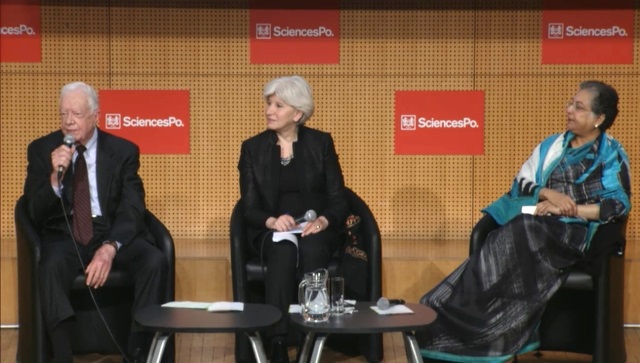Event discusses: How can we make sure world leaders take the bold action needed to tackle climate change – and what can young people do to spark political momentum?
How can we make sure world leaders take the bold action needed to tackle climate change – and what can young people do to spark political momentum?
These were the issues discussed at a special event held on Earth Day (22 April 2014) at Sciences Po University, Paris, France, entitled ‘Climate Change: Who Will Lead?’ The event engaged young people in the climate debate and encouraged them to mobilize their political leaders to take bold action to address climate change ahead of the deadlines for international agreements on climate and sustainable development in 2015.
Attending the event were Jimmy Carter, former President of the United States and Nobel Peace Laureate, and Hina Jilani, a leading activist in Pakistan’s women’s movement and international champion of human rights. Mary Robinson, who was unfortunately unable to attend in person, delivered remarks via telephone. All three are part of The Elders, which organised the event.
In her remarks, Mrs Robinson stated: “We need you [young people] if we are going to get to the transformational leadership that will be required to ensure that our world stays below 2 degrees Celsius above pre-industrial standard.
“In essence, that means we must reach zero carbon emissions by 2050. And the world is not on course for that at present. We also need to achieve this goal equitably and fairly, which is the climate justice approach.”
Mrs Robinson went on to highlight four messages relevant to achieving climate justice:
1. We must begin with the injustice of climate change – the impacts it is having on the poorest and most vulnerable who have done least to cause the crisis.
2. We need to understand and respond to the gender dimensions of climate shocks which undermine already poor livelihoods.
3. Young people should call for the scale of transformative leadership that is needed for an equitable climate deal.
4. Young people in different regions of the world need to link together and create a constituency of demand for practical actions that move us away from fossil fuel energy.
Former President Jimmy Carter said: “The most crucial question the human race has ever faced is the question of climate change and global warming,” before adding: “The struggle for the hearts and minds of the public, especially young people, is intense.”
Hina Jilani added: “A human rights framework for climate change policies would be extremely useful…. The priority of climate change in a human rights lens would be ‘who suffers?,’ ‘Where do they suffer?’, and ‘why are they suffering?’.”
The session ended with students, activists and young entrepreneurs asking questions related to climate change, and how political momentum can be increased on this subject. The event was moderated by Laurence Tubiana, professor at Sciences Po and Columbia University and Director of IDDRI (Institute for Sustainable Development and and International Relations).
Related Links
Mary’s Robinson’s remarks to The Elders event, Science Po, Paris, 22 April 2014
Climate Change: Who Will Lead? – The Elders.org: Op-Ed by Mary Robinson and Jimmy Carter


